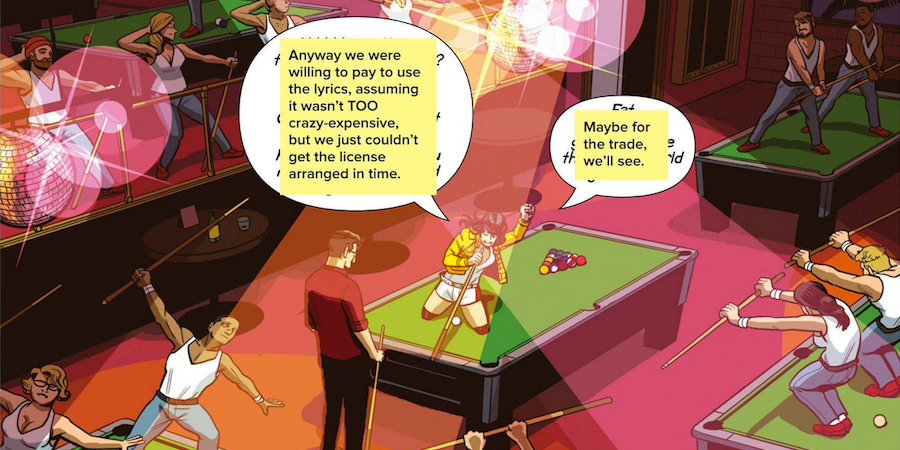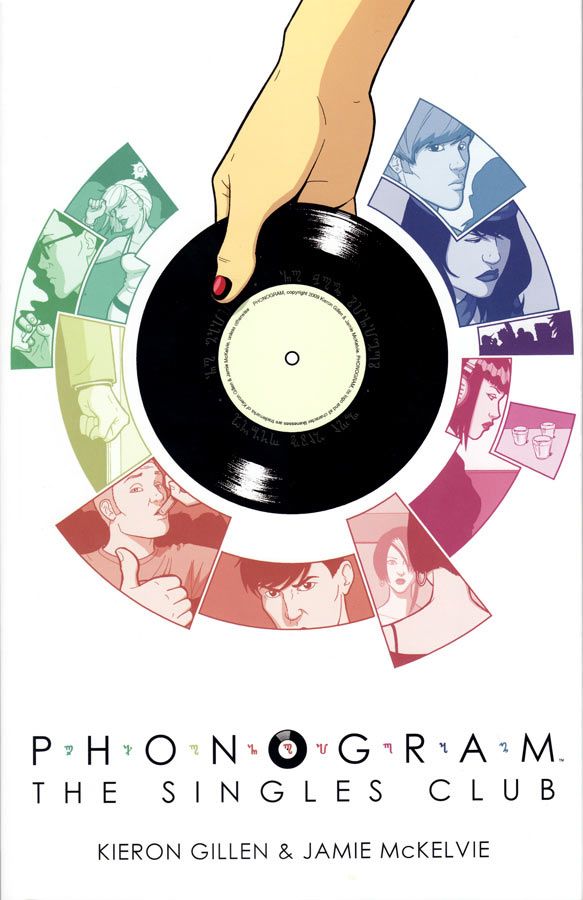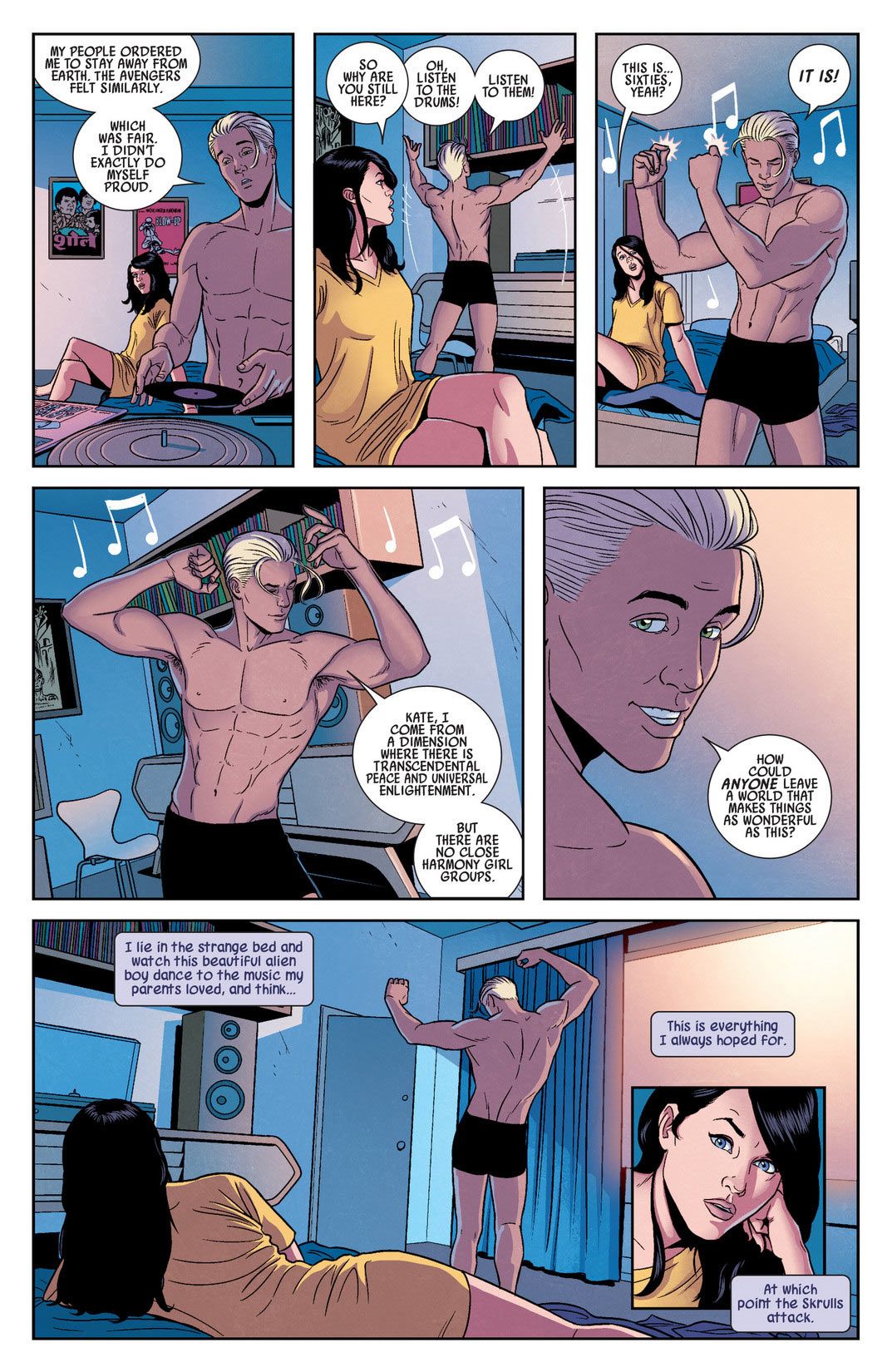Matt Fraction and Kieron Gillen have listened to a lot of music. Some of it on repeat, constantly, while writing comics. During a panel at Seattle's Emerald City Comicon late last month moderated by novelist Ben Saunders, Fraction and Gillen elaborated on the music they are obsessed with, felt strongly toward and, in some cases, can't listen to ever again. "There will be sound, there will be insight," said Saunders at the start of the panel, "and for those of you on psychotropic drugs, a little bit of synesthesia."
Pop music figures prominently in both Fraction's and Gillen's works, and each of them reflected upon when they first became aware of the pop music landscape. Both writers singled out the death of John Lennon in 1980. "My dad didn't know how better to express why he was upset," said Fraction, "other than to sit me down in front of a record player. I was four... I decided that 'Help' was about someone falling out of an airplane without a parachute, which is still not a bad interpretation."
Later on, Gillen recalled Jimi Hendrix's "Voodoo Child" as the first song he listened to that caused an ecstatic response, calling it "very big and very scary" and having a feeling that it was "the hard stuff." Fraction, on the other hand, had vivid memories of listening to AM radio when he was sick as a child. "I remember having fever dreams to AM radio, being really sick," he said, "and having hallucinations in first grade... waiting for the fever to break and having these weird half-nightmares to Billy Joel's 'Allentown.' Everytime I hear 'Allentown,' I get this weird, queasy pit in my stomach."
That early emotional exposure made an impact on both creators, leading to pop music references and motifs showing up extensively in both of their works. A large percentage of the panel was given over to playing music while Fraction and Gillen's comics were projected on a screen, and the overall effect was one of synthesis.
A scene in Fraction's "Sex Criminals" features one of the main characters dancing to, singing along with, and strutting to Queen's "Fat Bottomed Girls." (For copyright reasons, Fraction was not able to reproduce the lyrics in the book, which led to a memorable visual joke involving Post-Its on word balloons). Moderator Saunders played the song, the scene played out on the screen and, as promised, it was a moment of synesthesia, albeit one that did not require any psychotropic drugs.
Gillen elaborated on Kenickie, a Britpop band that greatly influenced his series "Phonogram," and whose song "Come Out Tonight" plays a prominent role in the comic. "'Come Out Tonight' was kind of the one that got them attention," said Gillen. "What I loved about them was that I never met anyone who truly loved Kenickie who wasn't one of my kind of people -- they were three 16 year-old-girls and one of their slightly older brothers on drugs." For Gillen, knowing about Kenickie was a signifier, a byword. It was a shorthand for knowing that other people shared his cultural interests. "They were my last teen crush band," he said, adding that Britpop became "a lot more bloke-y" soon after Kenickie.
Gillen also revealed to the crowd that he always imagined "Phonogram" having a theme song. He sang it to the crowd. It had the exact same music as the Spider-Man theme song, except with "Phonogram" in place of "Spider-Man."
Music continues to play a major role in Gillen's creative process. "I don't want to say [it's] magic because I'm kind of a strict atheist," he said, "but the ritual is very, very there."
Fraction has only recently been able to rediscover music, due to his home life."I've lost a lot of time that I used to think of as precious," he said. "I haven't had the luxury of listening to stuff anymore -- it's just this past winter that I've started listening to things again." Fraction listened extensively to Brian Eno's "Here Come the Warm Jets" while writing "Casanova" and played the track during the panel. It's a broad, fuzzy, wall-of-sound, expressive piece of music. It's repetitive and highly meditative. One can see how Fraction would write to it. The reiterating loop works in drums, but retains the same general structure and feel. Vocals eventually also build in the background, buried by the other sounds before emerging to the forefront. They are wordless, for all intents and purposes, but they are there.
The room at the convention center was silent during the track. Fraction was bent down, listening, his hair and glasses obscuring his face. When it ended, the audience erupted into applause. "Apparently Eno would, sometimes, he would have a few tracks laid down," said Fraction, "and he'd do an interpretive dance, and they'd play what he was doing... That record, 'Here Comes the Warm Jets,' it feels timely like 'Doolittle' or 'White Light, White Heat'... It feels like a record out of time. It's so hard to place."
Gillen also characterized the Ronettes' pop hit "Be My Baby" as being highly influential to his run on "Young Avengers." "Everything that gets into a comic will be interpretation," he said. "That leads to the work... Always the aim of 'Young Avengers' was to be 'Be My Baby' -- with this thing where everything leads to everything else and it's this great holographic structure -- it is perfect."
Gillen, Fraction and Saunders also discussed Queen's standing in the pop pantheon, The Beach Boys' Brian Wilson, whether or not Hendrix was prog (Fraction said he wasn't, Saunders said he was), and Radiohead. Toward the end of the panel, Gillen got wistful, talking about how the feelings he had toward music when he was young could not be entirely replicated when he was older, but how that was also okay.
"You can only lose your virginity once," Gillen said. "You can't have a first love twice. Getting older and dying is part of the point."



